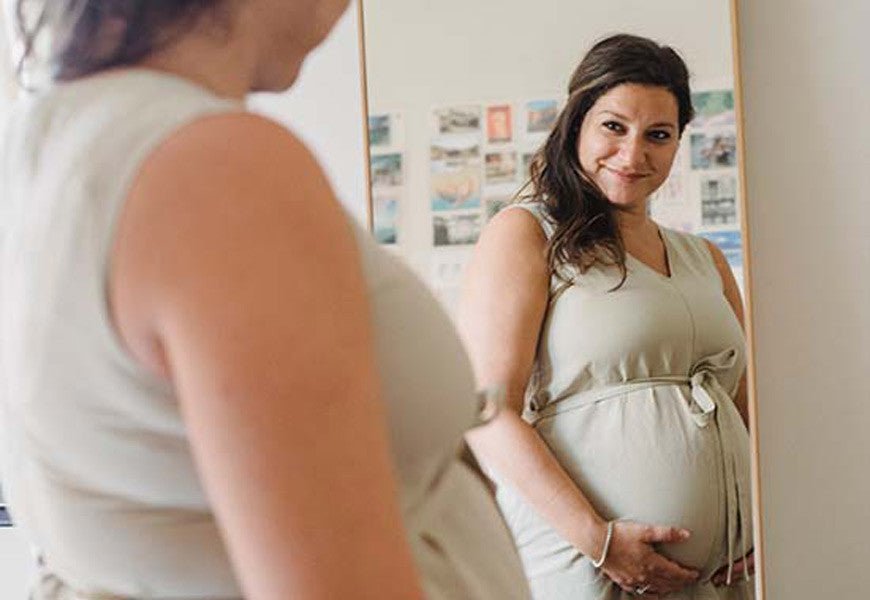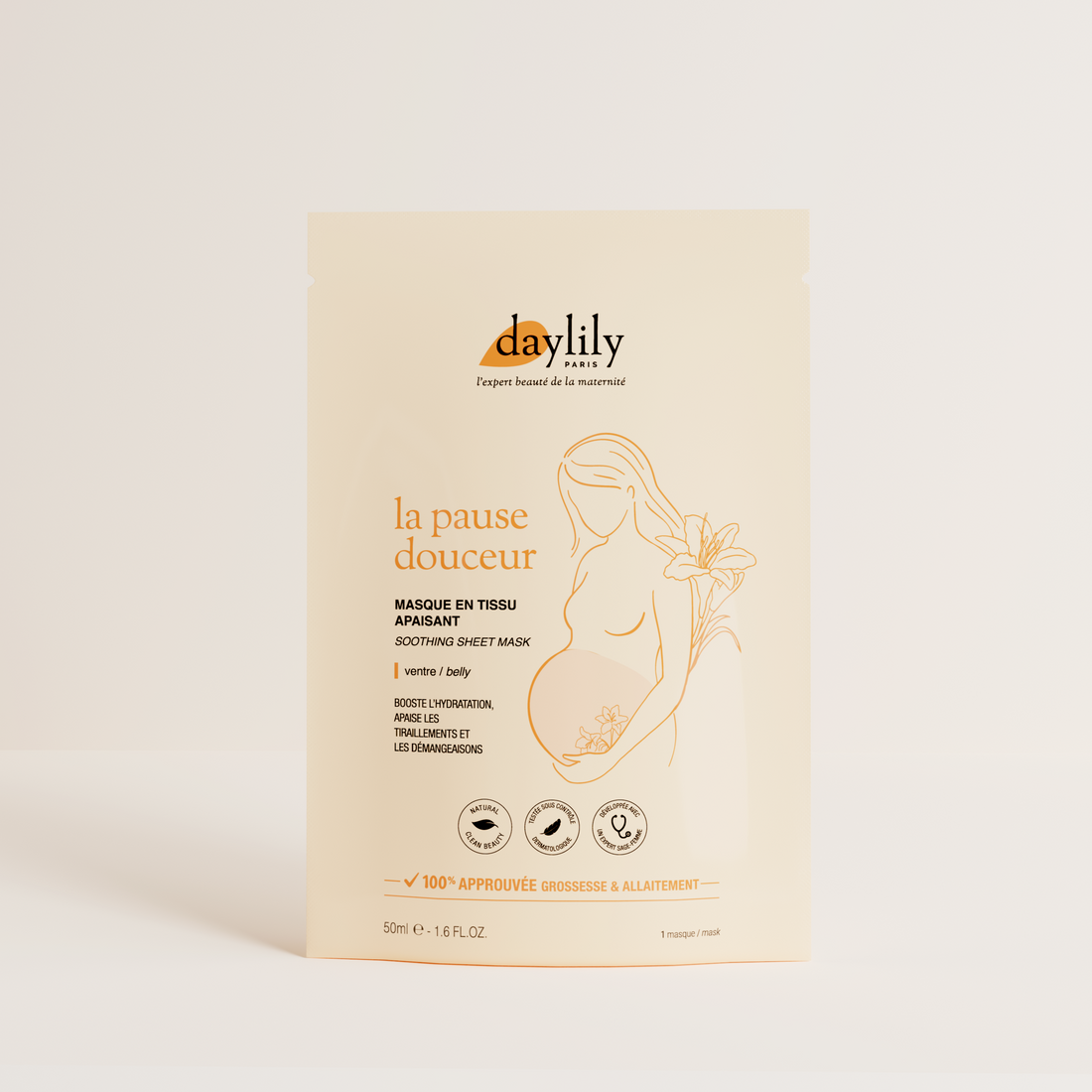- What is late pregnancy?
- What are your chances of being a mother after 40?
- Consider PMA
- Prepare for your late pregnancy
- The benefits of late pregnancy
- What are the risks of late pregnancy and how to monitor them?
- Cesarean delivery
What is late pregnancy?
Late pregnancy concerns pregnant women aged 40 or over. It is a pregnancy considered to be at higher risk, and therefore more closely monitored. If it is sometimes clumsily judged, don't get me wrong!
What are your chances of being a mother after 40?
This is a question that many women ask themselves. Rest assured, the fertility rate decreases with age because the oocytes age and become fewer and fewer, but they do not disappear! On average, it is estimated that women over 40 have a 6% * chance of becoming pregnant. After 45, it is almost impossible to get pregnant naturally. If you need to be more patient after 40, a natural pregnancy can definitely happen to you. And if this is not the case, there are other possible options available to you.
Consider PMA
If it is difficult for you to get pregnant naturally, you can resort to Assisted Medical Reproduction. In France, it is possible to use PMA up to the age of 43, it is covered by Social Security. Depending on the quality of your ovarian reserve, you may also be referred to egg donation. You can obtain information from specialized clinics such as IVI, where competent staff will be able to inform you and take care of you.
Prepare for your late pregnancy
The preconception consultation
To carry out your late pregnancy with peace of mind, prepare for it. You will avoid peaks of stress and questioning!
As a first step, we recommend that you make an appointment for a preconception consultation. The preconception consultation is not only reserved for women over 40, but it is even more recommended from this age onwards. Indeed, during this first appointment with a gynecologist or midwife, they will carry out a health check-up , but also inform you of the possible risks and complications during your pregnancy, depending on your profile. This appointment will also be an opportunity for you to ask the doctor all the questions that are on your mind in order to start your pregnancy in a more informed manner and with less anxiety.
A balanced rhythm at home

Late pregnancy is often felt to be a little more tiring by mothers. So remember to take it easy and adopt a healthy and balanced pace to avoid fatigue! Discover some simple tips that can make a difference once pregnancy begins:
• Practice gentle physical activity
• Adopt a healthy and varied diet
• Try to move away from what is a source of stress for you
If during your pregnancy you feel particularly tired, consider consulting your doctor. If he deems it necessary, he is authorized to give you sick leave earlier than in the case of a traditional pregnancy.
And when you're feeling down, there's nothing better than taking care of yourself ! Pamper yourself after a pleasant bath with Huile Sensorielle to nourish your skin! Why not also let yourself be tempted by our La Pause Douceur, a very soft fabric mask that will soothe the itching and tightness in your stomach.
The benefits of late pregnancy
Beware of preconceived ideas! Late motherhood has many advantages and remains a real moment of happiness, even if it involves some risks. Indeed, don't lose sight of the fact that with age, we become wise! And yes, often more established at 40 than at 20, you have acquired experience and wisdom at this age. After 40, we are also often more financially stable. Two significant advantages that will make it easier for you to cope with the long-awaited arrival of your baby.
These two small studies will give you something to dispel preconceived ideas about late pregnancy:
• A study published in Population and Developmental Review* indicates that the children of older mothers are in better physical shape, do better in school and are taller!
• At the same time, another study from the University of Medicine of Boston* proves that women who have a child after the age of 33 are twice as likely to live to be 95!
If science says so...!
What are the risks of late pregnancy and how to monitor them?

Discussing the risks of late pregnancy is not the most optimistic subject to discuss, but it is nevertheless important to be informed. The objective is to become aware of the risks in order to monitor them and not to make you feel guilty!
• Miscarriage. This is one of the first risks. As your eggs age, they become more fragile over the years. The uterus becomes less toned over time. This is why, with age, the risk of miscarriage increases. Very close monitoring is therefore strongly recommended, particularly during the first three months of pregnancy.
• The risk of chromosomal abnormalities (trisomy) also increases. However, screening tests are becoming more and more efficient and carried out early enough. This test is generally done during the first trimester using an ultrasound and a blood test. Depending on the results, an additional test called NIPT may be requested: this is the collection of the baby's DNA through the mother's blood, it also takes the form of a blood test.
• A risk of growth retardation is possible. If usually, three ultrasounds are carried out during a pregnancy, in this more particular case it is recommended (although not obligatory) to carry out two additional ones: one at 28 weeks and another closer to the term.
Among other risks, we also talk about the risk of high blood pressure leading to pre-eclampsia (an attack of eclampsia can lead to convulsions), the increase in gestational diabetes, a risk of prematurity, etc. Numerous tests and checks will take place throughout your pregnancy to monitor these factors: control of blood pressure, fetal vitality, monitoring, etc.
Furthermore, keep in mind that we are talking about “risks” and not fatality! From now on, medical follow-up and close appointments allow mom and baby to be closely monitored. After 40, many mothers are able to carry out a pregnancy without any problems and give birth to a healthy baby!
Cesarean delivery
The big day finally arrives. One of the options available to you is a cesarean section. In fact, nearly 40% of pregnant women over the age of 40 undergo a cesarean section. Nothing abnormal about this, in truth, several reasons explain it. After the age of 40, the quality of the uterus is poorer and the contractions supposed to facilitate labor for childbirth are therefore less effective. Fetal macrosomia (i.e. when the baby's weight is greater than 4kg and can therefore cause complications during childbirth) is another common reason, this is linked to gestational diabetes which is more common during late pregnancy, the baby is then larger than normal. Surgical operation is therefore preferred to natural childbirth. We also observe more often fetal dystocias such as the baby in breech position which therefore also requires a cesarean section. During the last ultrasound, your gynecologist will inform you whether or not a cesarean delivery is necessary. Your doctor may suggest this delivery because it allows you to take more precautions during a late pregnancy.
Remember that if it is recommended to you, it is to protect you and your baby!
Bibliography:
- https://www.passeportsante.net/fr/Actualites/Dossiers/DossierComplexe.aspx?doc=tomber-entreprises-40-ans-quels-risks
- https://sante.journaldesfemmes.fr/fiches-sexo-gyneco/2522787-chance-probabilite-tomber-entreprises-age/
- https://time.com/4709403/older-mother-benefits/
- https://www.eurekalert.org/news-releases/884368






















